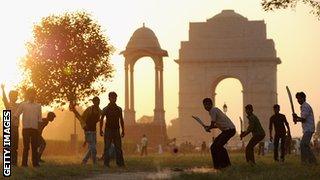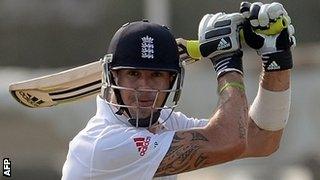India v England: Gatting, Foster and Dravid on how to win in India
- Published

Sachin Tendulkar and Monty Panesar
It is one of cricket's most well-worn adages that England struggle on the sub-continent and they begin this winter's campaign chasing a first Test series victory in India since 1984-85., external
On an eventful tour that began with the assassination of Indian Prime Minister Indira Gandhi, external - and then British Deputy High Commissioner Percy Norris - England recovered from losing the first Test to triumph 2-1.
However, they have won just one of their last 12 Tests in India,, external which is regarded by many players as the toughest of all tours.
Ahead of the start of the first Test in Ahmedabad on Thursday, BBC Sport asks a panel of experts why touring India is so difficult, what it takes to win there - and whether England can do it. They are:
Mike Gatting:, external England vice-captain on 1984-85 tour. Scored 575 runs at an average of 95, including a career-best 207 in Madras. Now managing director of cricket partnerships for the England and Wales Cricket Board.
Neil Foster:, external Essex pace bowler who took 14 wickets at 20 apiece despite playing only two Tests in the 1984-85 series.
Jonathan Agnew:, external A seam-bowling replacement for the injured Paul Allott midway through England's 1984-85 tour but played just one tour game. Now BBC cricket correspondent.
Rahul Dravid:, external India legend who retired this year with 13,288 runs at an average of 52 from 164 Tests. Only Sachin Tendulkar and Ricky Ponting have scored more Test runs. Part of the Test Match Special commentary team for this series.
The ultimate tour
Gatting: "It is the toughest tour. It's a place you have to go to and win if you want to be the complete cricketer.

"They have such passion for cricket in India, and I share that passion" - Mike Gatting
"It is a challenge in so many ways, but it's a lovely place to tour - cricket is such a passion out there and I share that passion. It's a special place.
"It was a huge tour for me in 84-85 - it was the making of me. I realised that I could play Test cricket, that I was good enough."
Foster: "India was a fascinating country to tour. It was certainly the best tour I went on from an individual point of view. If you get the mentality that it will be a tough tour, then you will struggle."
Agnew: "The crowds are very excitable - very noisy when India are doing well and very quiet when they're not. It can be quite a distraction on the boundary."
Culture shock
Gatting: "You'd wander down the street and you'd have 100 people following you, wanting an autograph or wanting to speak to you.
"The thing you can't get your head around is there is so much wealth, yet so much poverty at the same time.
"The open sewers, the smell, people with just a bit of clothing on - that's all they own. You can see people living on the streets from your bedroom window. I still struggle now.
"In Nagpur we slept on camp beds - only the captain and the coach had a proper bed.
"And you knew you would get ill from the food or water at some point on tour - you just accepted that."
Agnew: "I was working in a window factory when I got called up. Two days later I was in Calcutta.
"You roomed with players in those days. You played cards, chatted. It fostered a very strong team bond. You became really good mates.
"You'd pack your luggage off on the train, you wouldn't see it for two days, and then it would turn up at the next hotel.
"The hotels are much more comfortable now and there's much more entertainment, but it's still tough."
Don't get in a spin
Gatting: "You know you're going to be playing on some turning wickets, so you need to have a really good gameplan when you're batting.

Monty Panesar's spin alliance with Graeme Swann "will be a factor", according to Rahul Dravid
"I used to watch the ball closely, so you know which way it's going to turn - that makes a huge difference."
Foster: "Nowadays the wickets spin less than they did, but spin will play a big role - even if India don't allow use of the Decision Review System."
Gatting: "You need to rotate the strike, hit straight down the ground and sweep. Shot selection is everything.
"You have to try and get the bowler to bowl differently, so by coming down the pitch to him, you try and manoeuvre the field."
Dravid: "In Graeme Swann, England have a world-class spinner, but they will need a couple of spinners. Monty Panesar bowled well last winter, and having someone bowling well with Swann will be a factor."
Does pace have a role to play?
Foster: "Conditions vary depending on what part of the country you are in - it could be really hot and humid down south but quite fresh in the mornings up north.
"If it doesn't spin much, you have to be prepared to bowl your overs as a pace bowler.
"You could be looking at two days in the field so fitness is very much an issue. And you've got to be prepared to pitch it up."
Agnew: "It's hot, relentless cricket. Discipline and patience are key on what will be pretty flat tracks."
Dravid: "England have some good fast bowlers so it's going to be interesting."
Bucking the trend
Gatting: "The younger players will have had a taste of touring India with the England Performance Programme.

Kevin Pietersen is back in the England team for the first time since August
"That gives you a good insight but doesn't prepare you for facing Test bowlers.
"If England are to win, a couple of players have got to have exceptional winters.
"India are a talented team and so adept at playing in their own conditions, but they are just as susceptible as England to good bowling."
Agnew: "India's spinners are decent but I would be disappointed if they ripped through England.
"These series are won by making the most of the chances that come your way."
The view from India
Dravid: "England against India is always a high-profile series, so it will be a great one to watch.
"The India team will be pretty disappointed with losing 4-0 in England last summer and they will want to correct that with some good performances.
"They have some good young players, but the team is in transition so it's as good a time as any for England to be visiting India.
"It's going to be a big challenge for England but they have the players; they have the team."
You can listen to Test Match Special's ball-by-ball commentary on BBC 5 live sports extra, BBC Radio 4 LW and via the BBC Sport website. There will also be live text commentary on the BBC Sport website, tablets and mobiles, with regular features and analysis from Jonathan Agnew, Alec Stewart and Graham Onions.
- Published13 November 2012
- Published13 November 2012
- Published14 November 2012
- Published11 November 2012
- Published10 November 2012
- Published30 October 2012
- Published5 November 2012
- Published1 November 2012
- Published18 October 2012
- Published22 May 2012